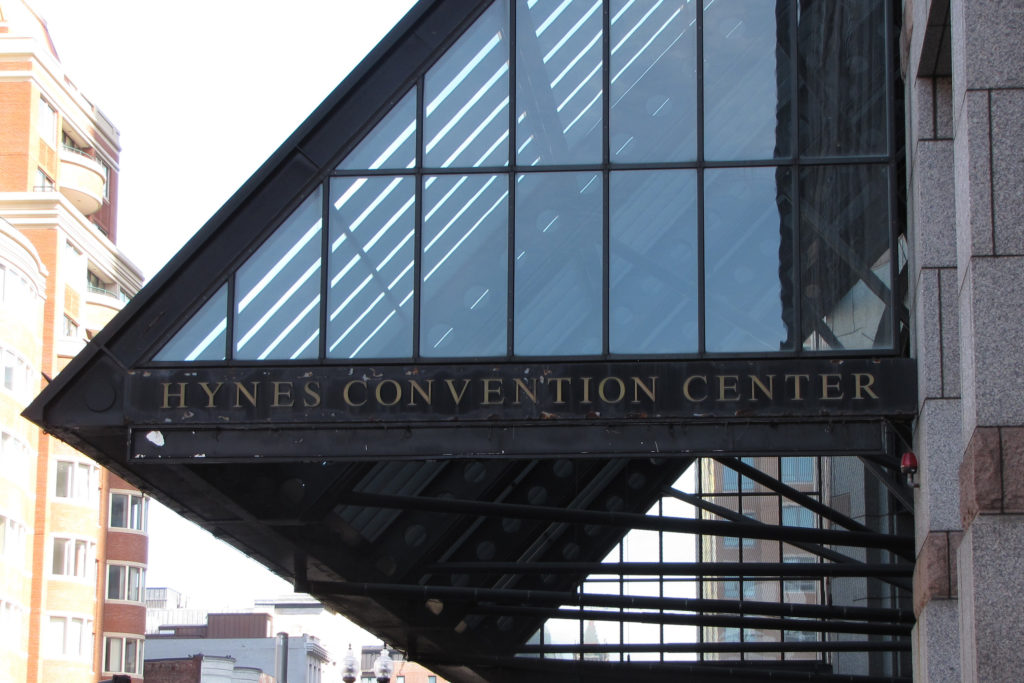By Marisa Goolgasian, news correspondent
A crowd of more than 6,000 gathered at Hynes Convention Center this weekend for the fourth annual New England Cannabis Convention.
The conference was held by the New England Cannabis Network, or NECANN, an organization created in 2014 to address the lack of established resources for New England’s fast-growing cannabis industry.
Advocates, patients, consumers and entrepreneurs alike assembled to learn about Massachusetts’s growing medical and recreational marijuana industry. More than 100 speakers and 150 exhibits participated, making the convention the largest gathering of cannabis and hemp industry professionals in the Northeast to date, according to the event’s website.
One featured speaker was Will Luzier, the Marijuana Policy Project’s political director for the Massachusetts division. Luzier previously served as executive director of the Massachusetts Interagency Council on Substance Abuse.
Luzier focused on updating attendees about how Massachusetts cannabis policy is changing, a timely topic as the final state regulations were set to be filed by March 15.
“I predict during the first two or three years following the openings of the first adult-use dispensaries in July of 2018, more and more marijuana will become available,” Luzier said. “The price will come down and the use of cannabis will become normalized the same way the use of alcohol has become normalized.”
As of now, there is no sign that Congress is discussing a revision of federal cannabis legislation. However, Luzier said change is on the horizon.
“I truly think that it will happen in the not-so-distant future, just not during this administration. Most likely five or six years from now, assuming we have a new president in 2021,” he said. “Several Democrats have indicated they are interested in cannabis law reform and many of them are potential presidential candidates. So it will take time. It’s hard to shrug off 80 years of prohibitionist propaganda. But it will happen.”

The day’s schedule also offered a variety of hands-on demonstrations, workshops and classrooms, ranging from “Maximize Your Yield: Low Stress Training, Topping, Fimming, Trellis and More Techniques” to “Cracking the Growth Marketing Code: Growing Your Cannabis Brand Online in 2018”.
One featured panel discussion, “Don’t Stop Now! The Continued Need For Advocacy in Our Communities and Beyond,” featured Joseph Gilmore, a third-year economics student at University of Massachusetts Boston.
Serving as the director of community outreach for the Massachusetts Recreational Consumer Council, as well as founder and president of Students for Sensible Drug Policy at UMass Boston, Gilmore works to engage the community in creating a safe, inclusive marijuana industry and assisting communities harmed by marijuana prohibition.
“An interesting statistic is that young people ages 18 to 24 are the most targeted demographic in terms of arrests for marijuana use and possession,” Gilmore said. “The war on drugs is still happening and it’s really affecting young people — us — and that’s why people our age need to stay involved and engaged so that this new industry evolves in a way that is inclusive of and welcoming to us.”
The convention featured hundreds of stands and booths managed by organizations addressing all things cannabis, from nonprofits and advocacy groups to the industry’s leading technology manufacturers.
One such table was managed by DigBoston, one of the city’s leading alternative news sources. The publication is known for its in-depth coverage of the cannabis community in the Greater Boston area, especially its interpretation of the dense and constantly-changing state legislation. Editor Chris Faraone offered some insight into the world of marijuana media.
“We’ve been covering cannabis for over 20 years, yet it’s a major learning curve,” he said. “Our job as communicators is to address people’s interests and explain things in terms they can understand without being lawyers or scientists. Home-grow stuff, how many plants they can have, where they can have them etc…”
The convention itself is a metaphor for Massachusetts’s cannabis community; the event has doubled in size every year since its inception, reflecting the rapid pace at which the industry is growing in conjunction with legislation reform.
Similarly, the medley of businesses and organizations displayed the variety of roles cannabis takes within the state, from holistic cure to lucrative business opportunity.
While the exact future of cannabis in the Commonwealth is hazy, one thing is certain: The marijuana industry has arrived and it’s here to stay.
“When it comes to cannabis in Massachusetts there are only two options: Get on board, or get out of the way,” Luzier said.






![A demonstrator hoists a sign above their head that reads, "We [heart] our international students." Among the posters were some listing international scientists, while other protesters held American flags.](https://huntnewsnu.com/wp-content/uploads/2025/06/image12-1200x800.jpg)


